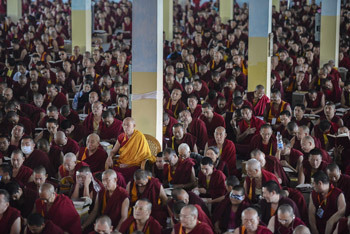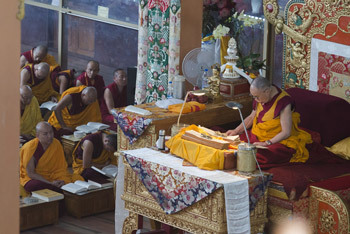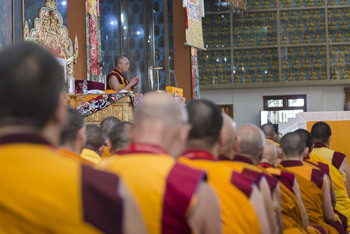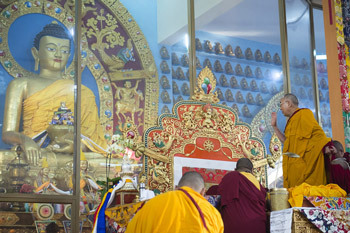Mundgod, Karnataka, India, 27 December 2014 - Thousands of monks, nuns and lay-people seated in the basement, in the temple, on its verandas and under the canopy over the courtyard were ready to listen to His Holiness the Dalai Lama when he arrived from Ganden Shartse a little early this morning.
Taking up ‘Zhamar Pandita’s Treatise on the Stages of the Path to Enlightenment’, a reference to the fourfold Sangha prompted His Holiness to explain that it consists of fully ordained monks and nuns, as well as male and female lay practitioners. Since the Buddha gave fully ordination to monks and nuns, the full fourfold Sangha should include Bhikshunis. However, when the practice of Vinaya or monastic discipline was introduced to Tibet according to the Mulasarvastivadin tradition, only monks were ordained. This was because there was no Mulasarvastivadin bhikshuni to invite from India. The Bhikshuni ordination does exist in China and Vietnam according to the Dharmagupta tradition. His Holiness said that efforts have been made and continue to be made to convene an international meeting to discuss and decide how to ensure the ordination of bhikshunis as part of the fourfold Sangha.
In the context of faith, His Holiness mentioned meeting people on the Lahaul and Spiti road. He asked them if they were Buddhists and they said yes. He asked what Buddhism is about and they said, “Taking refuge”. He asked, “Refuge in what?” and they didn’t know. He asked “What is a Buddha?” and they didn’t know. When he asked if Buddha and Brahma were the same, they said yes. He suggested that to take refuge in the Buddha, Dharma and Sangha, it is important that your faith is grounded in reason and understanding. Taking refuge because that is what your grandparents do is not a sufficient. If it were, we would have no need for the more than 300 volumes of the Kangyur and Tengyur.
“If you don’t know what enlightenment is,” he asked, “how can you develop the awakening mind of bodhichitta. With wisdom Bodhisattvas focus on enlightenment, while they focus on sentient beings through bodhichitta.
 |
Some of the many thousands of monastics attending
the fifth day of His Holiness the Dalai Lama's teachings watching on a
big screen in the basement of Ganden Jangtse Monastery in Mundgod,
Karnataka, India on December 27, 2014.
Photo/Tenzin Choejor/OHHDL
|
“To train the mind we need to investigate subtle impermanence and suffering among the four characteristics of each of the Four Noble Truths. I analyse these 16 characteristics every day. I also think about bodhichitta and in my reflective meditation I pay attention to the 37 harmonies of enlightenment.”
His Holiness talked about the various approaches adopted by different Lam Rim traditions. A text by Geshe Sharawa and the ‘Jewel Ornament of Liberation’ start with Buddha nature. Another approach that engenders a broad, far-sighted attitude is to begin with the idea of exchanging self for others.
As the texts move from the value of human life and the necessity of making it meaningful, they discuss impermanence and death, both of which occur on a gross level. Nagarjuna stresses that impermanence and selflessness have an important role in training the mind, so thinking about death is no ground for becoming despondent.
In connection with death His Holiness spoke about the phenomenon of ‘thukdam’, which Buddhists explain as what happens when the subtle consciousness remains even after clinical death has taken place. He mentioned recently seeing photographs of a Mongolian who did this for 25 days. He said that in the mid 20th century scientists did not recognise the mind as an entity independent of the brain. Now there are scientists who do recognise it as such. And there is evidence that thought has an impact on the brain, which not long ago was considered to be impossible. He repeated that ancient Indian literature is a source of a great deal of knowledge of the mind, knowledge which could have a significant impact on the world in the 21st century. That will depend on reason and education more than mere faith.
Continuing to discuss death, His Holiness pointed out that despite their great achievements all the people involved with building the Great Wall of China and the Taj Mahal died in due course. From a Buddhist point of view what is important is the subtle mind that goes on when we die. That is the basis of our karmic imprints.

|
His Holiness the Dalai Lama during the fifth day of his teachings at Ganden Jangtse Monastery in Mundgod, Karnataka, India on December 27, 2014. Photo/Tenzin Choejor/OHHDL
|
Reflecting on death makes us consider what is valuable in our lives. The Buddha described a householder’s life as full of drawbacks. First there is childhood and education; then you need to find a job, to get married, to have children and decide whether you have too few or too many. You have to bring them up and educate them. Then worry about their finding a job and so forth. It’s a litany of worry and unease. If, on the other hand, you engage in practice of the Dharma, you have the prospect of achieving liberation. The Buddha showed that to attain enlightenment you have to work hard.
Reflecting on death involves the three fundamentals: that death is inevitable; its time is uncertain and when it comes only spiritual experience will be of any help. These give rise to the nine reasons: death will definitely come; our lifetime cannot be extended and even while we are alive there is little time for spiritual practice. When we will die is uncertain because the life span in this world is uncertain; the causes of death are very many while the causes of life are few, and the body is very fragile. Finally, friends will not help, our resources will not help and even our body will not help. Despite all this, even when we are about to die or we see someone else about to die, we fail to realise that this will happen to us. We too will die.
His Holiness compared this to our attitude to the consequences of climate change. As weather becomes more extreme, the glaciers melt, sea levels rise, threatening to inundate great cities. And yet people still engage in war and conflict. If they could be friendlier and more co-operative, perhaps some of these disasters could be offset.
As he read first Zhamar Pandita’s book and then Phabongka Rinpoche’s ‘Liberation in the Palm of Your Hand’ His Holiness described the death bed scene. “Your covers stink. Your relatives stand around anxiously helpless. Once you actually die, there is no guarantee of where you will be born next; everything is uncertain. And once you are dead, your body will be removed and disposed of.”
He mentioned Je Tsongkhapa’s concern that the ideas of bodhichitta and Buddhahood are introduced early in order that people acquire a sense of the whole path. He felt that a delay between beginning spiritual practice and developing bodhichitta is an opportunity lost, whereas it is actually the core of the path.

|
His Holiness the Dalai Lama joining in prayers at the conclusion of the fifth day of his teachings at Ganden Jangtse Monastery in Mundgod, Karnataka, India on December 27, 2014.
Photo/Tenzin Choejor/OHHDL
|
“Practising Dharma doesn’t mean setting up a small room in your house and sitting up straight in it. It’s about keeping a watch on your mind wherever you are. Having an awareness like this is important because then wherever you are you’ll know what is to be done or not done. Dharma doesn’t mean going anywhere else, it’s about watching your mind right where you are.”
For those whose minds are distracted, the power of analysis can induce the mind to remain on the object because it is interested in it. This helps focus the scattered mind. Some people find training in single-pointedness difficult, because the mind feels unnecessarily constricted. For them analysis can help.
“We need to be far-sighted from the outset. As I said before, compassion is directed at sentient beings, while wisdom is directed towards Buddhahood. If you feel constricted it can lead to stress and depression. It’s better to rest and relax. Dharma practice is about tackling your disturbing emotions. Among the hardest things to abandon, among the eight worldly concerns, is a desire for a good reputation. You want to be known as a good meditator and adept. This is one of the drawbacks of not being mindful of death.”
Tomorrow, local Tibetans will offer prayers for His Holiness’s long life. He will continue the teaching, although he does not expect to finish either text, but has already promised to complete them next year.
















